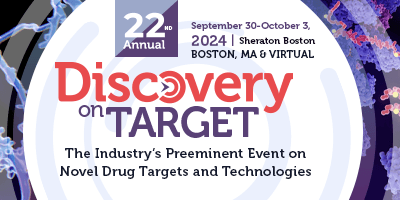2024年的晚餐短期課程*(僅限面對面型式)
Discovery on Target的短期課程由講師主持,以對特定領域提供詳細信息為目的,並設有問答時間。每個課程都包括針對初學者或希望深入瞭解的人的入門課程,以及關於本次會議未能充分解釋的更技術性方面闡述。講師來自工業界和學術界,其中許多人在該領域皆被認可為權威或具有指導經驗。
以下是2024年度(當前的)議題和講師。追加的課程即將公佈。
短期課程僅限面對面型式。
* 需要額外費用或單獨報名。
2024年9月30日(一) 5:00 - 7:30 pm
SC1: Protein Degraders: A Focus on PROTACs from an ADME-Tox Perspective
Instructors:
Prasoon Chaturvedi, PhD, Vice President & Head, DMPK, C4 Therapeutics, Inc.
John Erve, PhD, President, Jerve Scientific Consulting
Topics to be Covered:
- Measuring ADME properties in vitro and in vivo and specific challenges
- Metabolism of PROTACs and influence of linker length on stability
- Case study of optimizing a PROTAC
- Safety issues unique to PROTACs
- Circadian rhythm considerations
Who Should Attend:
Scientists in the field of proteolysis targeting chimeras (PROTACs) and would like to deepen their understanding of these molecules and the physicochemical attributes that may contribute to their success as oral drugs. ADME scientists and medicinal chemists wishing to understand PROTACs from a drug safety and metabolism perspective. Graduate students and academic scientists interested in learning more about this rapidly developing new drug modality.
INSTRUCTOR BIOGRAPHIES:
 Prasoon Chaturvedi, PhD, Vice President & Head, DMPK, C4 Therapeutics, Inc.
Prasoon Chaturvedi, PhD, Vice President & Head, DMPK, C4 Therapeutics, Inc.
 John Erve, PhD, President, Jerve Scientific Consulting
John Erve, PhD, President, Jerve Scientific Consulting
SC2: Fragment-Based Drug Design: Advancing Tools and Technologies
Instructors:
Daniel A. Erlanson, PhD, Chief Innovation Officer, Innovation and Discovery, Frontier Medicines Corporation
Ben J. Davis, PhD, Research Fellow, Biology, Vernalis R&D Ltd.
Topics to be Covered:
- Pros and cons of fragment-based approaches
- What makes a good fragment; properties of a good fragment library
- Finding, validating, and characterizing low-affinity ligands
- The importance of using orthogonal screening methods
- What to do with a fragment-growing, linking, and more
INSTRUCTOR BIOGRAPHIES:
 Daniel A. Erlanson, PhD, Chief Innovation Officer, Innovation and Discovery, Frontier Medicines Corporation
Daniel A. Erlanson, PhD, Chief Innovation Officer, Innovation and Discovery, Frontier Medicines Corporation
 Ben J. Davis, PhD, Research Fellow, Biology, Vernalis R&D Ltd.
Ben J. Davis, PhD, Research Fellow, Biology, Vernalis R&D Ltd.
SC3: DNA-Encoded Libraries
Instructors:
Svetlana Belyanskaya, PhD, former Vice President, Biology, Anagenex
Ghotas Evindar, PhD, Drug Discovery Consultant, Former DEL Platform Senior Manager and Group Leader at GlaxoSmithKline
Topics to be Covered:
- Introduction to DNA-encoded libraries
- Pros and cons of using DNA-encoded chemical libraries
- Structure of the DNA coding region and how it has evolved over time
- Affinity-based selection strategy and how it guides hit-picking
- Data analysis and the decision-making logic in hit confirmation
- Introduction to and benefits of one-bead, one-compound (OBOC) DNA-encoded libraries
INSTRUCTOR BIOGRAPHIES:
 Svetlana Belyanskaya, PhD, former Vice President, Biology, Anagenex
Svetlana Belyanskaya, PhD, former Vice President, Biology, Anagenex
 Ghotas Evindar, PhD, Drug Discovery Consultant, Former DEL Platform Senior Manager and Group Leader at GlaxoSmithKline
Ghotas Evindar, PhD, Drug Discovery Consultant, Former DEL Platform Senior Manager and Group Leader at GlaxoSmithKline
SC4: Best Practices for Targeting GPCRs, Ion Channels, and Transporters with Monoclonal Antibodies
Instructors:
Ross Chambers, PhD, Vice President, Antibody Discovery, Integral Molecular, Inc.
Joseph Rucker, PhD, Vice President, Research and Development, Integral Molecular, Inc.
Topics to be Covered:
- Overview of different classes of membrane proteins, including structure, mechanism, and their role in disease
- Membrane protein biochemistry and antigen preparation strategies
- Use of mRNA and DNA for eliciting immune responses against membrane proteins
- Antibody discovery and methods to enable isolation of functional antibodies
- Review of mechanisms relevant to complex membrane proteins (GPCRs, ion channels, transporters), in vitro assays for measuring the detailed binding and function of antibodies
- Review of promising membrane protein targets and antibodies in development
INSTRUCTOR BIOGRAPHIES:
 Ross Chambers, PhD, Vice President, Antibody Discovery, Integral Molecular, Inc.
Ross Chambers, PhD, Vice President, Antibody Discovery, Integral Molecular, Inc.
 Joseph Rucker, PhD, Vice President, Research and Development, Integral Molecular, Inc.
Joseph Rucker, PhD, Vice President, Research and Development, Integral Molecular, Inc.
SC5: Developing Physiologically Relevant 3D Models
Instructor:
Madhu Lal Nag, PhD, CSO, InSphero
INSTRUCTOR BIOGRAPHIES:
 Madhu Lal Nag, PhD, CSO, InSphero
Madhu Lal Nag, PhD, CSO, InSphero
2024年10月2日(三) 6:00 - 8:30 pm
SC6: Protein Degraders: A Focus on PROTACs from a Beyond Rule of Five Space Perspective
Instructor:
John Erve, PhD, President, Jerve Scientific Consulting
Topics to be Covered:
- Comparison of Rule of 5 and Beyond Rule of 5 space
- Importance of intramolecular hydrogen bonds for solubility and permeability
- Determining chameleonicity and its importance for PROTACs
- Transporters and potential drug-drug interactions (DDIs)
Who Should Attend:
Scientists in the field of proteolysis-targeting chimeras (PROTACs) who would like to deepen their understanding of these molecules and the physicochemical attributes that may contribute to their success as oral drugs. ADME scientists and medicinal chemists wishing to understand PROTACs from a drug safety and metabolism perspective. Graduate students and academic scientists interested in learning more about this rapidly developing new drug modality.
INSTRUCTOR BIOGRAPHIES:
 John Erve, PhD, President, Jerve Scientific Consulting
John Erve, PhD, President, Jerve Scientific Consulting
SC7: Chemical Biology for Covalent Discovery, Phenotypic Screening, and Target Deconvolution
Instructors:
Paul Brennan, PhD, Professor, Nuffield Department of Medicine, University of Oxford
Brent Martin, PhD, Vice President, Chemical Biology, Scorpion Therapeutics
Aarti Kawatkar, Associate Principal Scientist, Chemical Biology & Proteomics, AstraZeneca R&D
Topics to be Covered:
- Chemical biology assays and probes for target engagement and mechanistic understanding
- Chemoproteomic methods and reagents for covalent ligand drug discovery
- Comparison of various chemical biology approaches (mass spectrometry, affinity-bead methods, thermal profiling, and more)
- Use of quantitative mass spectrometry-based proteomics and global proteomics
- Cysteine profiling and covalent inhibitors for target discovery and occupancy
- Design and screening of chemogenomics libraries for target identification
- Case studies highlighting use of proteomics for target engagement and deconvolution
INSTRUCTOR BIOGRAPHIES:
 Paul Brennan, PhD, Professor, Nuffield Department of Medicine, University of Oxford
Paul Brennan, PhD, Professor, Nuffield Department of Medicine, University of Oxford
 Brent Martin, PhD, Vice President, Chemical Biology, Scorpion Therapeutics
Brent Martin, PhD, Vice President, Chemical Biology, Scorpion Therapeutics
 Aarti Kawatkar, Associate Principal Scientist, Chemical Biology & Proteomics, AstraZeneca R&D
Aarti Kawatkar, Associate Principal Scientist, Chemical Biology & Proteomics, AstraZeneca R&D
SC8: Biophysical Approaches for GPCRs
Instructor:
Matthew T. Eddy, PhD, Assistant Professor, Chemistry, University of Florida, Gainesville
Topics to be Covered:
- Overview of GPCR structure and biology
- GPCR expression and purification technologies for structure-function investigations
- Biophysical methods for small molecule screening and characterization
- GPCR dynamics - examining conformational changes associated with ligand binding and activation
- Emerging technologies - introduction to cutting edge biophysical technologies including single-molecule imaging, NMR, and computational approaches
INSTRUCTOR BIOGRAPHIES:
 Matthew T. Eddy, PhD, Assistant Professor, Chemistry, University of Florida, Gainesville
Matthew T. Eddy, PhD, Assistant Professor, Chemistry, University of Florida, Gainesville
SC9: Fundamentals of Generative AI for Drug Discovery
Instructors:
Parthiban Srinivasan, PhD, Professor, Data Science and Engineering, Indian Institute of Science Education and Research, Bhopal
Petrina Kamya, PhD, Global Head of AI Platforms, Vice President Insilico Medicine; President, Insilico Medicine Canada, Insilico
Topics to be Covered:
- Demystifying generative AI concepts and key terminologies
- How predictive and generative AI works in de novo molecular design
- Overview of large language models (LLMs)
- Prompt engineering, RAG, and fine-tuning for biopharma-specific LLMs
- Leveraging language models in drug discovery research with case studies
Who Should Attend:
This course is designed for medicinal chemists, molecular modeling users, and project managers seeking to harness the capabilities of modern generative AI concepts and integrate them into their work.
INSTRUCTOR BIOGRAPHIES:
 Parthiban Srinivasan, PhD, Professor, Data Science and Engineering, Indian Institute of Science Education and Research, Bhopal
Parthiban Srinivasan, PhD, Professor, Data Science and Engineering, Indian Institute of Science Education and Research, Bhopal
 Petrina Kamya, PhD, Global Head of AI Platforms, Vice President Insilico Medicine; President, Insilico Medicine Canada, Insilico
Petrina Kamya, PhD, Global Head of AI Platforms, Vice President Insilico Medicine; President, Insilico Medicine Canada, Insilico
* 活動內容有可能不事先告知作更動及調整。






